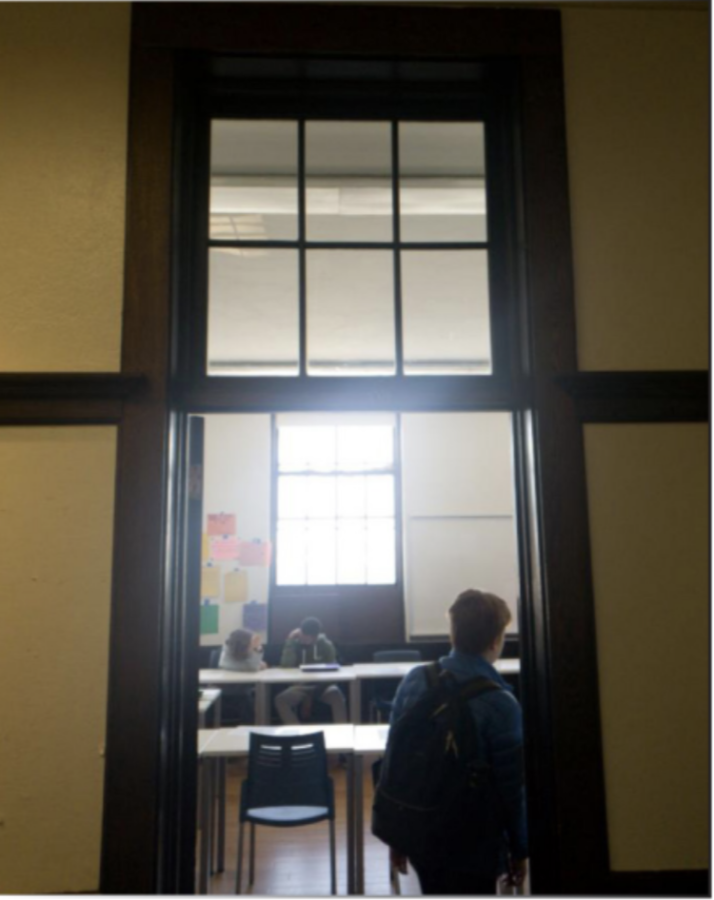Order in the Court. Sentenced to Study Hall.
As I was sitting in the library focused on homework, a buzz from my phone jolted me out of my zone. I spied an email notification from Sarah Bates, head of Upper School, with the subject line, “Introducing Mandatory After-School Study Hall.” The email proceeded to detail a new punishment being implemented at Poly, essentially detention with a slight tweak. The main reason study halls were developed is that Poly wants all its students to take community time and their classes more seriously by respecting the school and their teachers’ time. In an interview with the Polygon, Bates said, “It felt incredibly disrespectful for students to be choosing not to go to class or assembly.” No matter how much they say, “mandatory this, mandatory that,” students have had no real punishment for skipping an assembly or a beloved Upstander Workshop, until now.
Since the faculty has not had this option in recent years, I’m skeptical as to whether it will be utilized or not. So far about 40 students have been, mostly for incomplete assignments. The deans and Eileen Avvocato, who manages attendance, are able to refer students to study hall for excessive tardies or skipped classes. Before implementing this measure, Bates emphasized that there were about 20-30 missed classes per day. This number has gone down to about 1-2 per day.
There are two ways I see study hall going in the future: Students will be given a mandatory study hall left and right, or no one will receive them. Bates hopes to prevent this with the name change (from detention to after-school study halls) so faculty will refer students to them for academic issues, rather than behavioral ones. I still believe that in some regard teachers will have control over when they send students and particularly who they decide to send. This could lead to cruel punishment and unequal distribution.
Poly is on a tear of trying to improve culture, by shaming students for not throwing out their trash or teaching students to be upstanders. These study halls are an extension of attempting to force students to care and be respectful. The worst part of this punishment is missing after-school activities, which foster a sense of purpose in students, but then what extracurriculars will students miss? Funnily enough, students, at least during the spring, will not be missing a game of their regular season. The study halls are scheduled for Tuesdays and Thursdays, the spring sports’ off days.
This is not a coincidence, as the decision for the days of study halls was made with Richard Corso, director of athletics. Bates remarked that if a student is fine with missing a practice but upset about missing a game that maybe they should think about that. Bates said, “Because your season is short, I would believe that missing anything would be detrimental if you really care about your sports and your teammates.”
While Bates’ quotes suggest that the decision for the days of study hall are not intended to let athletes off the hook, what I still see here is a school wanting to uphold their reputation of a stellar sports school. The outcome of games reflect on Poly, while practices don’t. Poly is willing to start punishment, but is making sure their athletes still get to play. The school is sending the message that they prioritize sports over character.
Then again, I believe that for some this may not even be a bad thing. If someone with an overwhelming amount of extracurriculars wants to have a focused study hall due to their lack of time and abundance of work, this might be seen as a blessing. The school is trying to affect change in students’ attitudes towards the community and their work, but they could actually have the opposite impact. Students may go as far as to be late to class on purpose or skip out on assemblies to have this down time. Poly would be ineffective in their efforts to create active and professional participants in the perfect community they are attempting to make.
Instead of Fs, we have E’s. Instead of detention, we have mandatory after-school study halls. We constantly talk about staying quiet in the library, instead of the deeper seeded world issues that manifest themselves in our community, such as comments with undertones of racism or homophobia for example. Then when these issues are addressed as in the Upstander Workshops, some members of the community, including some faculty, treat them like a joke. If “hard” or “upsetting” topics or punishments are sugar-coated or made fun of, how well will the Poly community fare in the real world? If the faculty and administration expect us to be professional and get to class or turn assignments in on time, they should respect us enough to treat us like adults, yet they continuously patronize us with bogus terms. This strategy serves minimal long-term purpose. Some may say that these terminology changes are linked to real changes, but I encourage you to consider how much this change even serves students.
If you love this place, you have to be invested in its growth and success, which often involves being critical. So I want you to consider a few things in your pursuit to better our school. Evaluate whether detention aids students’ advancements, personally or academically, and if so, whether that includes all of its students.

Alida Lissak is the current Head News Editor for the Polygon. Starting her sophomore year, Alida has been a staff writer for the Polygon and last year...

























